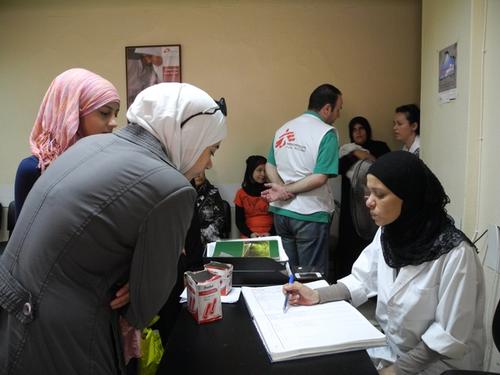Violent sectarian clashes between residents of two of Lebanon’s most deprived districts are leaving ordinary people caught in the crossfire as they struggle to access healthcare and get on with their daily lives. Médecins Sans Frontières (MSF) teams are providing medical services to people on both sides of the frontline.
Syria Street in Lebanon’s northern city of Tripoli is the frontline of a violent conflict between two neighbourhoods. On one side of the street is Jabal Mohsen, an Alawite neighbourhood where around 60,000 people live crammed into an area of 2.5 square km. On the other side is Bab al-Tabbaneh, home to mostly Sunni Muslims and one of the country’s poorest districts.
Both sides of the street are lined with damaged storefronts, revealing the scars of a conflict that has dragged on for decades. But in the past two years, the violence between the rival neighbourhoods has escalated dramatically, echoing the war in neighbouring Syria.
When clashes break out, often resulting in high numbers of casualties, residents from both sides are trapped inside what is essentially a war zone. When the violence last flared in May 2013, at least 35 people were killed and more than 250 were wounded. Since the Syrian uprising began in March 2011, more than 190 people have been killed and 1,200 wounded in fighting between the two neighbourhoods.
Despite their sectarian differences, the two communities are alike in suffering poverty, overcrowding and huge needs for healthcare, made worse by the recent arrival of large numbers of refugees from Syria.
“Both neighbourhoods share very low economic indicators, with around 80 per cent of the population living on less than US$4 per day, poor access to affordable healthcare and no health insurance,” says Sébastien Vidal, MSF’s field coordinator in Tripoli. “This situation has been exacerbated by the massive influx of Syrian refugees over the past year, putting a burden on the already vulnerable host communities.”
Jabal Mohsen: basic healthcare and stabilisation of injured
Jabal Mohsen is a dense hillside settlement overlooking the city of Tripoli. During the clashes, shops and schools close and many residents stop going to work, while tanks from the Lebanese army block Syria Street in a bid to impose peace by physically separating the two neighbourhoods.
With all entrances blocked, entering and exiting Jabal Mohsen becomes almost impossible. People in the area face enormous difficulties accessing the most basic healthcare and have no choice but to attempt to cross a frontline to receive lifesaving medical care.
“There are no hospitals here,” says Vidal. “A pregnant woman in labour or a patient in need of emergency medical care can only reach the closest hospital in downtown Tripoli by crossing the neighbourhood they consider hostile.”
In November 2012, MSF started providing medical services in Jabal Mohsen’s clinic, the only health facility in the area. “Since we started offering medical services, the patient flow has been constant, with our doctors and nurses working tirelessly to respond to the needs,” says Vidal. And when fighting erupts, the team ensures that residents have continuous access to basic healthcare. “Crucially this includes stabilising the injured before they can be referred outside the enclave, as and when the security situation allows.”
Bab al-Tabbaneh: new clinic busy from day one
Bab al-Tabbaneh, on the other side of Syria Street, is home to some 80,000 Lebanese, as well as an increasing number of Syrian refugees. “This neighbourhood is one of the most deprived districts in Lebanon and access to healthcare services is very poor,” says Vidal. MSF opened a clinic in Bab al-Tabbaneh in April 2013. “On the day of the opening, the clinic was already full of patients, most of them women and children who had never had access to free or affordable healthcare,” says Vidal.
Inside the clinic, two doctors and two nurses provide free consultations and treatment to an average of 60 patients each day. About 20 per cent of these are Syrian refugees, a particularly vulnerable group.
“Most patients are young children suffering from chest infections or gastroenteritis due to the dire living conditions,” says Vidal. “Many children also suffer from iron and vitamin deficiency because they lack access to nutrient-rich foods, making them even more vulnerable to infections.” Between April and late-July 2013, more than 3,500 patients received medical attention at the clinic.
Responding to medical emergencies
In addition to providing basic healthcare in Jabal Mohsen and Bab al-Tabbaneh, MSF supports the emergency room of Tripoli Governmental Hospital, the only public hospital in the north of the country. Since May 2012, MSF has been training hospital staff and providing the medical supplies and equipment necessary for dealing with acute medical emergencies. When violence flares up between the residents of Jabal Mohsen and Bab al-Tabbaneh, around 40 per cent of the wounded are generally admitted to Tripoli Governmental Hospital.
Since Syrian refugees began flooding into Lebanon in November 2011, MSF has been adapting its response and opening new medical projects in the country. While the Lebanese community has made tremendous efforts to integrate and help the refugees, its capacity to cope – especially in already impoverished areas such as Tripoli or the Bekaa Valley – is reaching its limits.
“It is essential to guarantee support to the Syrian refugees, but also to the communities in Lebanon which are hosting them,” says Dr Gustavo Fernandez, MSF’s Geneva-based programme manager for Lebanon. “MSF is committed to continue to bring quality medical care to people regardless of their religion or political affiliation.”
On Friday 23 August 2013, two bomb explosions occurred near two mosques in Tripoli, wounding around 800 people and killing 48, according to official estimates. MSF treated eight of the wounded in its Jabal Mohsen clinic and 10 in its Bab al-Tabbaneh clinic. Seven of the patients had severe injuries and were transferred to hospital. More than 50 wounded people in need of intensive care were admitted to the emergency room of Tripoli Governmental Hospital.



